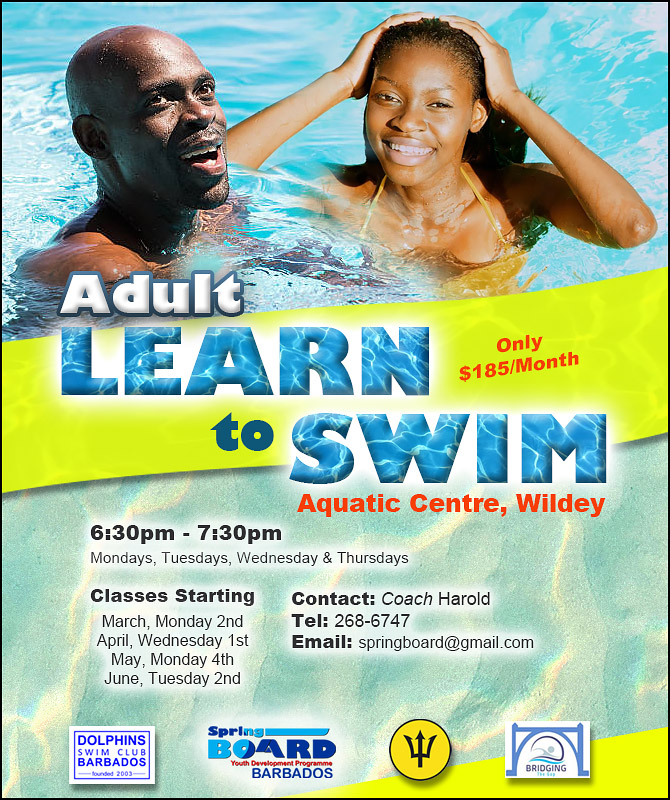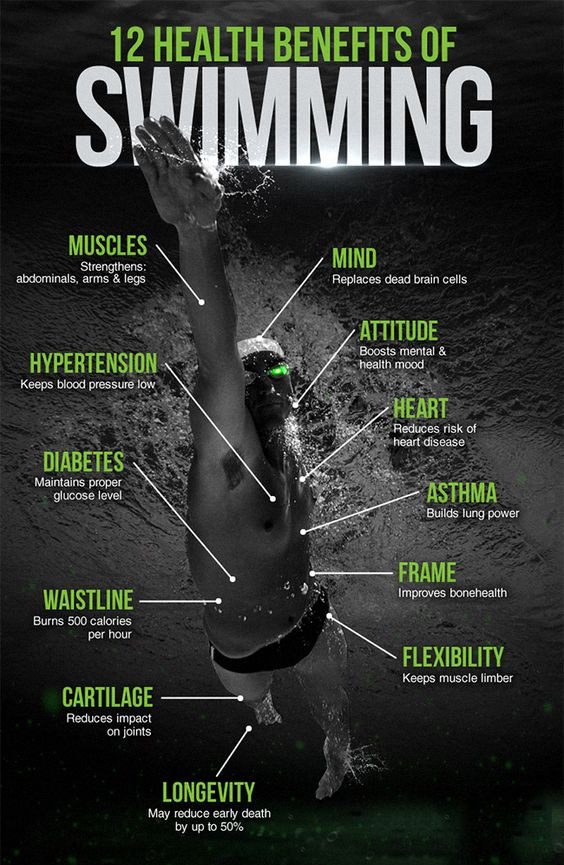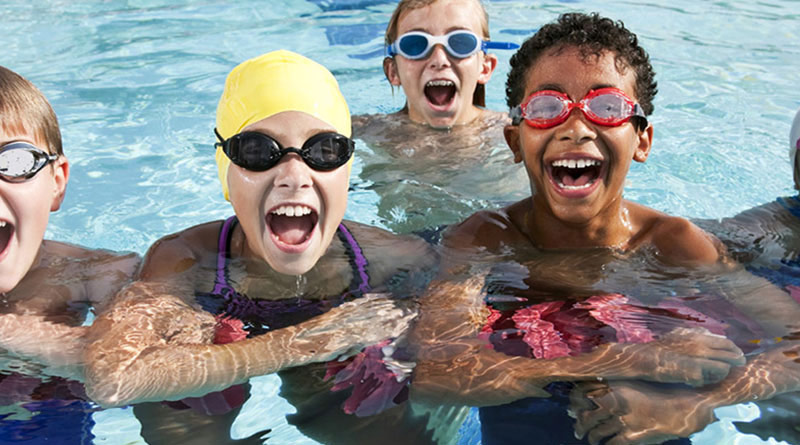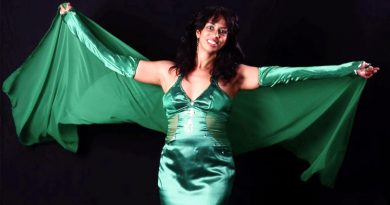The Joy Of Swimming Lessons In Barbados
In Barbados there are plenty swimming clubs for children and adults, swimming is fun and it’s the only sport that can save your life or someone else.
The importance of swimming is an asset to everyone.
When we learned to swim freestyle as children, most of us swim flat in the water, with little or no hip rotation as our arms are doing the majority of the work but with lessons your child will learn the art of swimming in all styles.
Don’t hesitate; get your child into a Barbados swim club today and boost their self-esteem.
Visit the Barbados Aquatic Centre.
You may ask yourself question like; Does my child really need swimming lessons? Every situation and family is different, so of course your child’s individual needs are the first thing you’ll want to consider.
Given the individual variations, here are the top six reasons why children need swimming lessons.
- It’s Harder to Learn as an Adult
Although Barbados is surrounded by water, some things are just easier to learn as a child than as an adult, and swimming seems to be one of those things.
Adults who don’t know how to swim can have a difficult time learning, whereas a young child can “soak up” swimming instruction relatively quickly.
- Developmental Enhancement
It’s been shown that children’s physical development gets a boost when they swim. Swimming teaches coordination, and how to move different parts of the body at the same time.
It also helps the brain – it takes some concentration to move those parts of the body together.
- Confidence
Children who take swimming lessons may develop a sense of confidence. They have accomplished something – they’ve learned an important skill!
A whole world opens up when your child is a confident swimmer. He or she can enjoy the water and relax in situations where there’s water play.
- Safety
Even if there are no other reasons, your child needs swimming lessons for safety.
Of course, if a swim instructor or class is unsafe, this defeats the purpose and you should consider pulling your child out of such a class. But learning to swim means peace of mind when your child is on a boat, or out at the many popular beaches around Barbados or near any body of water he or she could fall into.
Knowing how to swim can make the difference between life and death.
- Exercise and Health
The fitness aspect of swimming can’t be ignored. In this day and age of video games and “screen time,” children need physical activity more than ever. Swimming is a skill your child can use as he or she grows up, too.
Water aerobics and swimming laps for exercise is great for all stages of life: pregnancy, with small children, as an elderly person with joint problems, and so forth. Learning to swim is a skill that can be invaluable later in life as well as during childhood.
- Friends and Socializing
Has your non-swimming child felt left out when there’s a pool party? What about when everyone is meeting up at the pool in the summer?
Knowing how to swim can open your child up for all kinds of social opportunities. And then there are the lessons themselves – swim clubs in Barbados and group lessons provide an opportunity to meet other children who may share some of the same reservations as your child.
It can help to know that others are a little afraid of swimming, too!
There are undoubtedly more reasons why your child needs swimming lessons than just these six. It’s a very valuable skill.
Pitfalls Of Parenting – Electronic Devices and Children’s Development – CLICK HERE

Health Concerns
- Asthma
There have been concerns about the chlorine in pools aggravating asthma in people – particularly children – who have this breathing disorder.
If you think this is a possible concern for your children, consider outdoor pools only so the chlorine vapors are not trapped inside with your children. And make sure you have any asthma medication handy
- Ear Infections
“Swimmer’s Ear” may have something to do with bacteria in the water. Skin and eye infections can also be caused by microbes in pool water called “recreational water bacteria.”
- Legionnaires’ Disease
Transmitted by breathing water vapor contaminated with the bacteria, Legionnaires’ disease is a lung disease that has been linked to swimming pools.
Safety Tips
- Recognize an Unhealthy Pool
Avoiding an unhealthy pool is an important part of staying safe. And to avoid them, you need to recognize them. But how do you know for sure? While it can be hard to tell, here are some tips.
* If the water looks clear and clean and the pool itself is clear blue (not green or brown), then that’s a good sign.
* Look to see if water is lapping over the filters. These are the drainage grates on the top of the pool’s walls. And listen to make sure the pool’s filters and pumps are running. If you’re in doubt, ask to see them.
* Does it smell clean? A slight chlorine smell is acceptable, but heavy chlorine or other chemical smells are a bad sign. Any bad odors are an indication that the pool may not be clean.
* The area around the pool should not be overly slimy or slippery. Not only is this unsafe with regard to slips and falls, it also indicates a film of algae, fungus, bacteria, or some other microbe. The same goes for the pool tiles on the inside and the sides of the pool.
- Shower before You Jump In
Chemicals from sunscreen, deodorant, body lotion, hair products, urine, and so forth can mix with pool disinfectants to create carcinogenic compounds, sources say.
- Pool Rules
Talk to your children about pool hygiene – no peeing or spitting in the pool, for instance. Make sure they know not to swallow pool water. And if your children are sick, don’t let them swim and contaminate the pool (especially if they have a digestive illness).
- Ask the Management for a Tour
Check out the pool’s facilities. With a well-run pool, the staff will not mind taking you around and showing you how the pool is maintained.
Armed with these tips and other research, your family should be able to enjoy a swim-filled summer safely. Barbados is known for its high standards for swimming pools.
Easter, Summer and Christmas Camps in Barbados – CLICK HERE

Seven Great Water Exercises for Seniors
Exercising in water can be a very healthy activity for anyone, but seniors seem to benefit especially from exercising in water.
The water helps compensate for poor balance and eases the impact on painful joints. Water exercise also may help boost metabolism. Here are seven great water exercises for seniors.
Remember, always check with your doctor before beginning any exercise program or regimen.
- Swimming Laps
Sometimes, we forget the simple approach – just swimming laps is excellent exercise. It raises your heart rate and doesn’t impact your joints.
Even if you don’t know a lot of fancy strokes, just moving through the water regularly for 30 minutes or so is excellent exercise. Your whole body is involved!
- Aerobics
Water aerobics are a wonderful way for seniors to get aerobic exercise without fear of falling or coming down too hard on their joints.
When you join a water aerobics class, you don’t have to worry about thinking up exercises; just follow the instructor. Taking a class has the added benefit of social time as well.
- Kicks
Using a kickboard or holding to the side of the pool, you can do flutter kicks. If you’re using a kickboard, you can do laps and measure your progress.
- Water Jogging
Jogging in the water adds resistance and takes the pressure off your joints. The deeper the water, the more calories you burn, sources say.
Just jog in the water like you would on land, but it will feel a lot different. Some people like to wear a buoyancy belt when they water jog.
- Squats
Doing squats in water is especially helpful for those who have trouble with joint stress on land. It works best in water that’s waist or chest-deep.
Putting your hands on the side of the pool, squat with your feet shoulder-width apart. The water will come up to your neck. Then stand back up and repeat up to 40 times.
- Pushing/Pulling Weight
Using weights in the water is another option to add to your water exercise routine. Hold waterproof dumbbells, one in each hand.
Push the right dumbbell forward in the water while pulling back the left one, and vice versa. Repeat up to 40 sets. If you like, add your legs to the exercise and step forward with the corresponding leg when you push your arm forward.
- Stand on Tip-Toe
For those with arthritis or other joint problems, this exercise can help build and tone muscles in the lower leg.
Standing in chest-deep water, hold to the side of the pool and rise up on your toes and back down. Repeat 30 or 40 times. It’s just like standing on tip-toe on land, but with less weight on the joints.
Seniors can benefit a great deal from water exercise. If you have any questions and concerns, check with a trainer or instructor at your local YMCA gym or check out the Barbados swimming clubs.
And of course, get the okay from your doctor or health care professional before you start.
|
Alpha Sharks Swim Club Specialities: Learn-to-swim, Competitive Swimming |
Pirates Learn to Swim Specialties: Toddler Swimming & Adult Classes. |
Sunsplash Specialities: Learn-to-Swim |
|
Dolphins Swim Club Specialities: Child and Adult Learn-to-Swim, Competitive Swimming, Triathlon, Vacation Camps |
Pirates Swim Club Specialities: learn-to-swim, competitive swimming |
Titans Aquatic Swim Club Specialities: Learn to swim, competitive swimming |
|
Flying Fish Masters Specialities: Adult Learn-to-Swim, Adult Swimming |
Parent/Toddler Nicki Hunte (246) 233-2861 nicolerhunte@gmail.com Specialties: Toddler Swimming AND Adult classes available. |
Open Water Swimming Barbados Facebook: Open Water Swimming Barbados |
|
High Tide Aquatics Specialities: Learn-to-Swim, Competitive Swimming, Adult Swimming |
Silverfins Swim Club |
Swim Barbados Vacations |
| Heatwave Swim Club Margaret King (246) 235-5455 |
Sports on the Move Specialities: Adult & Child Learn to Swim |





